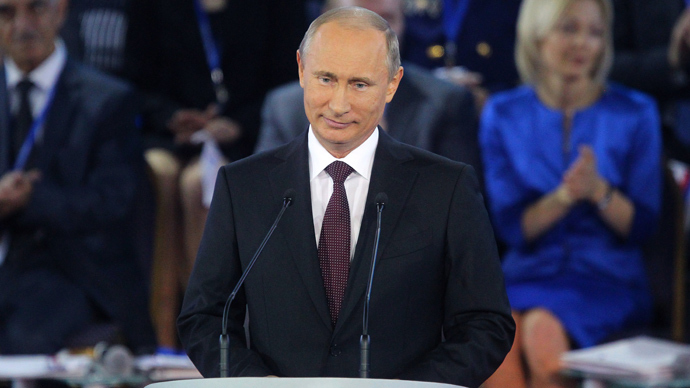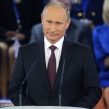
The Russian Public Seems to Be Less Receptive to Hate Propaganda
Publication: Eurasia Daily Monitor Volume: 13 Issue: 19
By:

Low oil and commodity prices have crippled the Russian economy, caused a massive devaluation of the ruble and a contraction of government budget expenditures. At a conference of the All-Russian Peoples Front (VNF—Vserossiysky Narodni Front—a pro-Kremlin populist organization) in Stavropol in the North Caucasus this week a woman from North Ossetia asked President Vladimir Putin: “Will incomes be inflation-adjusted? It is very difficult to live and feed a family in our republic with a fixed income of 12,000 rubles a month ($158).” A visibly irritated Putin replied that things are not that bad and Russia’s future can be seen "with guarded optimism," but spending must be balanced with income: “We cannot inflate social expenditures, though we need to maintain living standards” (Kremlin.ru, January 25). Translated from Kremlin administrative gibberish: Little if any inflation-adjustment state handouts forthcoming for the growing army of Russia’s low-income workers and pensioners.
Putin is still popular, but the gap may be growing between the struggling populous and the Kremlin. The loyal Kremlin-controlled VTsIOM pollster reports that half the population wants possible budget cuts to be aimed at trimming government bureaucratic institutions and state corporations, while health care and social spending must be maintained. Defense spending and modernization (rearmament) are Putin’s priorities, but not of the populous: VTsIOM reports a sharp reduction in public support for keeping the defense budgets immune to cuts from 27 percent in 2015 to 18 percent today (Wciom.ru, January 27).
Of course, Putin’s Russia is not a democracy, but it is not a tightly-sealed totalitarian state either. Since 1999 Putin has used television propaganda, social demagogy and petro-money handouts to maintain a high level of public support. Since elections are mostly a sham, poll results are an important feedback connecting the ruler and his subjects. The Kremlin finances its own pollsters to monitor the social and political weather which seems today to be unnerving: The highly-mobilized state of the Russian populous, the rallying around the Kremlin and the flag after the annexation of Crimea in March 2014 and the subsequent war in the eastern Ukrainian region of the Donbas, the popular anti-Western, anti-American backlash caused by sanctions are all apparently beginning to subside.
To maintain desirable public mobilization levels the Kremlin is redoubling its efforts. In an interview published this week, Security Council Secretary Nikolai Patrushev accused the US of seeking world domination and using NATO to weaken Russia, possibly promoting a disintegration of the Russian Federation “to take control of our vast natural riches that Russia owns without merit, according to the US.” Prompted by Washington, NATO is “moving its military infrastructure to Russia’s borders.” The US provoked the “unconstitutional overthrow” of Ukrainian president Victor Yanukovich in February 2014 which, according to Patrushev, in turn forced Russia to intervene to take over Crimea. Russia wants Ukraine to maintain territorial integrity (without Crimea, but with the Donbas), but the present rulers in Kiev are American stooges, according to Patrushev, “who are doing their master’s bidding to pull away from Russia—a policy, that if continued, will lead to total collapse of the Ukrainian economy and Ukrainian disintegration.” The Kremlin’s official opinion, as expressed by Patrushev and previously by Putin: “One nation inhabits both Ukraine and the Russian Federation, for the time being, divided [by the Russian-Ukrainian border]” (MK.ru, January 26).
Speaking at the VNF forum in Stavropol, Putin accused the Bolsheviks and Communist leader Vladimir Lenin of dismantling a unified imperial Russia to create the USSR as a confederation of legally independent republics with artificial borders: “The Donbas was handed over to increase the number of industrial workers in Ukraine—total lunacy.” At the same time Putin announced he is proud to have served for some 20 years in the KGB—“the armed vanguard of the Party.” Putin boasted he still keeps his Communist Party membership card. Putin is in fact more a Russian nationalist imperialist than a true communist, but it is important for him to keep his followers from both nationalist and communist imperialist constituencies happy and supportive: “We must further unite our nation” (Kremlin.ru, January 25).
Home critics—the so called “fifth pro-American column”—are also under attack. On January 12, the Chechen kingpin Ramzan Kadyrov accused Putin’s critics of being “traitors and enemies of the people” and Western spies that “must be prosecuted for their subversive activities.” Russian human rights activists strongly protested Kadyrov’s slur and petitioned the Kremlin, calling Putin to issue a reprimand. Kadyrov, in turn, organized last week in Grozny a mass rally of supporters, announcing that some one million people attended (close to the entire population of Chechnya). Kadyrov claimed the rally in Grozny represented the opinion of all Russians and provided Putin with a mandate to crush his opponents (Kommersant, January 28). The chief of presidential administration Sergei Ivanov fully supported Kadyrov (Kommersant, January 26). Putin’s representative in the Urals region, Igor Kholmanskykh, publicly agreed with Kadyrov: “We must get rid of the fifth column in Russian politics. They must be whipped [literally] into submission” (Interfax, January 27).
This week a group of prominent Duma deputies demanded that Andrei Piontkovsky and liberal Ekho Moskvy radio be investigated and punished for a personal blog Piontkovsky published last week on the Ekho Moskvy site calling for a separation between the Russian Federation and Chechnya. The deputies, including several committee chairs from the ruling United Russia Party, accused Ekho Moskvy and Piontkovsky of treason, support of terrorism, and undermining Russia’s constitution and territorial integrity: “If they do not like Russia, let them move abroad to the nation they serve [the US]” (Izvestia, January 28).
A massive witch hunt may be in the making, but the Russian public does not seem to be responding with much enthusiasm. A recent poll by independent pollster Levada-Tsentr shows that some 60 percent of Russians believe it is unacceptable for government officials to brand critics as “enemies of the people” and threaten to forcibly suppress opposition. Sympathy and support of Kadyrov has declined from 35 percent in 2015 to 17 percent today. Most Russians do not identify themselves with Putin’s critics, but they are disgruntled and frustrated not with them, but increasingly with the performance of Putin’s ruling elite (Vedomosti, January 28).




